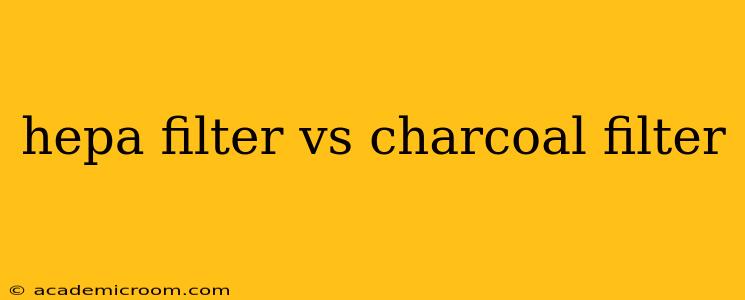Choosing the right air purifier can significantly impact your indoor air quality and overall health. A crucial element of any air purifier is its filter, and two popular choices are HEPA filters and charcoal filters. Understanding their differences is key to making an informed decision. This guide will delve into the specifics of HEPA vs. charcoal filters, helping you determine which best suits your needs.
What is a HEPA Filter?
HEPA stands for High-Efficiency Particulate Air. HEPA filters are designed to remove microscopic particles from the air, including dust mites, pollen, pet dander, mold spores, and even some bacteria and viruses. They achieve this through a complex network of fine glass fibers, trapping particles as air passes through. A true HEPA filter must meet a specific standard: it needs to remove at least 99.97% of particles that are 0.3 microns in size or larger. Particles smaller than 0.3 microns are generally less harmful, but a high-quality HEPA filter will still capture a significant portion of them.
What is a Charcoal Filter (Activated Carbon Filter)?
Charcoal filters, also known as activated carbon filters, excel at absorbing gases and odors. They are made from porous carbon material that acts like a sponge, trapping volatile organic compounds (VOCs), smoke, pet odors, and other airborne gases. This makes them ideal for eliminating unpleasant smells and improving the overall air freshness in your home.
HEPA Filter vs. Charcoal Filter: Key Differences
| Feature | HEPA Filter | Charcoal Filter |
|---|---|---|
| Primary Function | Removes particulate matter (dust, pollen, etc.) | Absorbs gases and odors |
| Particle Removal | Highly effective for particles 0.3 microns and larger | Ineffective at removing particles |
| Gas/Odor Removal | Minimal to no effect | Highly effective |
| Lifespan | Varies depending on usage and air quality | Varies depending on usage and air quality |
| Maintenance | Requires regular replacement | Requires regular replacement |
Which Filter is Better for Allergies?
For allergy sufferers, a HEPA filter is significantly better. Allergies are primarily triggered by particulate matter like pollen, dust mites, and pet dander, all of which are effectively removed by a HEPA filter. While a charcoal filter can help with some allergy-related odors, it won't address the root cause of the allergic reaction.
How long do HEPA filters last?
The lifespan of a HEPA filter depends on several factors, including the air quality in your home, the frequency of use, and the model of the air purifier. Generally, you can expect to replace a HEPA filter every 6-12 months. Always consult your air purifier's manual for specific recommendations.
Which Filter is Better for Smoke and Odors?
For smoke and odor removal, a charcoal filter is the more effective choice. Its ability to absorb gases and VOCs makes it ideal for eliminating the lingering smells of smoke, cooking, pets, and other sources. However, it's crucial to remember that a charcoal filter won't remove the particulate matter from smoke, so combining it with a HEPA filter is often recommended for comprehensive air purification.
How long do charcoal filters last?
Similar to HEPA filters, the lifespan of a charcoal filter varies. Factors like air quality and usage frequency play a significant role. You might need to replace it every 3-6 months, or even sooner if exposed to heavy odors. Check your air purifier's manual for specifics.
Can You Combine HEPA and Charcoal Filters?
Many air purifiers offer a combination of HEPA and charcoal filters. This provides the best of both worlds, effectively removing both particulate matter and gases/odors. This is a great option for those seeking comprehensive air purification, especially in environments with both allergies and odor issues.
Are there other types of air purifier filters?
Yes, besides HEPA and activated carbon filters, other filter types exist, including:
- Pre-filters: These capture larger particles, extending the life of the HEPA and charcoal filters.
- UV-C lights: These kill germs and bacteria passing through the filter.
- Electrostatic precipitators: These use electrical charges to trap particles.
The best combination of filters depends on your specific needs and the air quality issues you want to address.
By understanding the strengths and weaknesses of HEPA and charcoal filters, you can choose the air purifier that best suits your individual needs and enhances your indoor air quality. Remember to always consult your air purifier's manual for specific filter replacement recommendations.
